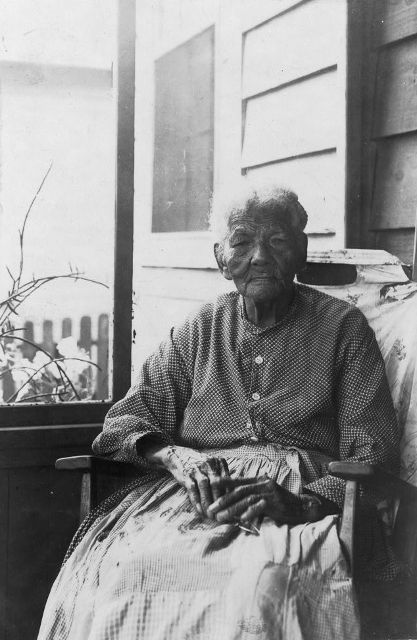
Charity Anderson, Toulminville, Alabama
Charity Anderson, who believes she is 101 years old, was born at Bell's Landing on the Alabama River, where her owner, Leslie Johnson, operated a wood-yard, which supplied fuel to the river steamers, and a tavern where travelers whiled away the delays of a dubious riverboat schedule.
Rheumatic and weak, she no longer ventures from her house in Toulminville, on the outskirts of Mobile, but sits, with her turbaned head and bespectacled eyes, rocking the long hours away in a creaky old chair and knitting or sewing, or just gazing into a past painted by the crackling flames in the fireplace.

"I has so much trouble gittin' up and down de steps and ober de groun', I jist makes myself happy heah, cause — thank de Lawd — I'se on Zion's March," is her resigned comment.
"Missy, peoples don't live now; and niggers ain't got no manners, and doan' know nothin' 'bout waitin' on folks. I kin remember de days w'en I was one of de house servants. Dere was six of us in de ole Massa's house — me, Sarai, Lou, Hester, Jerry and Joe. Us did'n' know nothin' but good times den. My job was lookin' atter de corner table whar nothin' but de desserts set. Joe and Jerry, dey was de table boys. Dey neber tetched nothin' wid dere han's, but used de waiter to pass things wid.
"My ole Massa was a good man. He treated all his slaves kind, and took good kere of 'em. But, honey, all de white folks wan't good to dere slaves. I's seen po' niggers 'mos' tore up by dogs and whupped 'tell dey bled w'en dey did'n' do lak de white folks say. But, thank de Lawd, I had good white folks and dey sho' did trus' me, too. I had charge of all de keys to de house, and I waited on de Missis' and de chillun. I laid out all de clo'se on Sat'dy night, and den Sunday mawnin's I'd pick up all de dirty things. Dey did'n' have a thing to do. Us house servants had a hahd job keepin' de pickaninnies out'er de dinin' room whar ole Massa et, cause w'en dey would slip in and stan' by his cheer, w'en he finished eatin' he would fix a plate for 'em and let 'em set on the hearth.
"No mam, Missy, I ain't neber worked in de fields. Ole Massa he neber planted no cotton, and I ain't seen none planted 'tell after I was free. But, honey, I could sho 'nuff wash, iron and knit and weave. Sometimes I weaved six or seven yahds of cloth, and do my house work too. I lernt the chillun how to weave, and wash, and iron, and knit too, and I's waited on de fo'th generation of our fambly. I jes' wish I could tell dese young chillun how to do. Iffen dey would only suffer me to talk to dem, I'd tell dem to be more 'spectful to dere mammies and to dere white folks and say 'yes mam' and 'no mam', instid of 'yes' and 'no' lek dey do now.
"All dis generation thinks of is 'musement. I neber had seen a show in my whole life 'tell jes' dis pas' yeah when one of dem carnival things wid de swings, and lights, and all de doin's dey have stop right in front of our house heah.
"And I ain't neber been in no trouble in all my life — ain't been in no lawsuits, and ain't been no witness eben. I allus treat ebrybody as good as I kin, and I uses my manners as good as I knows how, and de Lawd sho' has took good keer of me. Why, w'en my house burnt up, de white folks helped me so dat in no time you couldn't tell I ebber los' a thing.
"But, honey, de good ole days is now gone foreber. De ole days was railly de good times. How I wish I could go back to de days w'en we lived at Johnson's landing on de riber, when de folks would come to ketch de steamboats and we neber knowed how many to put on breakfas', dinner or supper fo', cause de boats mought be behin' times. I ain't neber had to pay a fare to ride a steamboat needer. I was a good lookin' yaller gal in dem days and rid free wherever I wanted to go.
"But whut's de use dreamin' 'bout de ole times? Dey's gone, and de world is gettin' wicked'er and wicked'er, sin grows bolder and bolder, and 'ligion colder and colder."